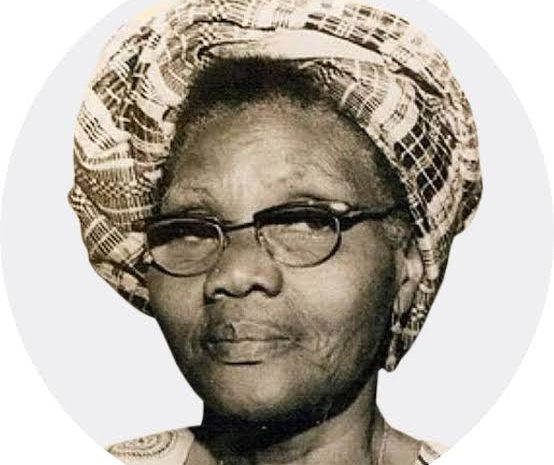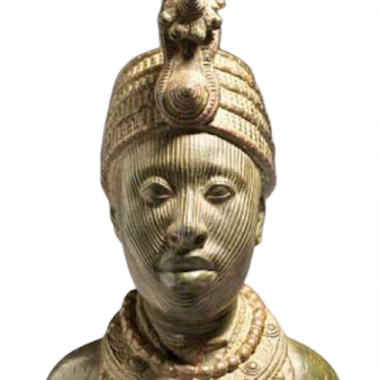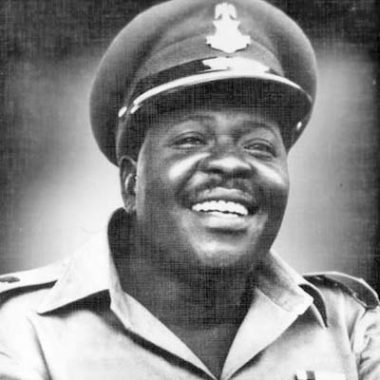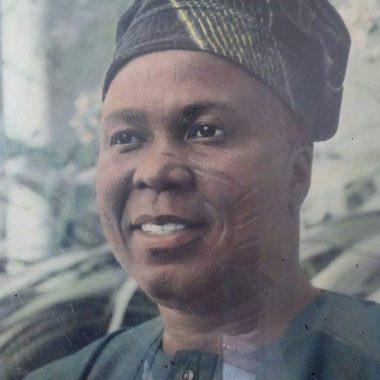
FUNMILAYO RANSOME-KUTI
FUNMILAYO RANSOME-KUTI
OUR HEROES
Francis Abigail Olufunmilayo Thomas was born on 25 October 1900, in Abeokuta, to Chief Daniel Olumeyuwa Thomas and Lucretia Phyllis Omoyeni Adeosolu of the Jibolu-Taiwo family. Her father was a son of a returned slave from Sierra Leone who traced his ancestral history back to Abeokuta in what is today Ogun State, Nigeria. He became a member of the Anglican faith, and soon returned to the homeland of his fellow Egbas. She attended Abeokuta Grammar School for secondary education, and later went to England for further studies. She soon returned to Nigeria and became a teacher. On 20 January 1925, she married the Reverend Israel Oludotun Ransome-Kuti. Ransome-Kuti received the national honour of membership in the Order of the Niger in 1965. The University of Ibadan bestowed upon her the honorary Doctor of Laws in 1968. She also held a seat in the Western House of Chiefs of Nigeria as an Oloye of the Yoruba people. Throughout her career, she was known as an educator and activist. Ransome-Kuti founded an organization for women in Abeokuta, with a membership tally of more than 20,000 individuals, spanning both literate and illiterate women. Funmilayo Ransome Kuti campaigned for women’s votes. She was for many years a member of the ruling National Council of Nigeria and the Cameroons (NCNC) party. She was the treasurer and subsequent president of the Western NCNC Women’s Association. Funmilayo Ransome-Kuti, otherwise known as Funmilayo Anikulapo-Kuti, was a teacher, political campaigner, women’s rights activist and traditional aristocrat in Nigeria. She served with distinction as one of the most prominent leaders of her generation. She was also the first woman in the country to drive a car. Ransome-Kuti’s political activism led to her being described as the doyen of female rights in Nigeria, as well as to her being regarded as “The Mother of Africa.” Early on, she was a very powerful force advocating for the Nigerian woman’s right to vote. She was described in 1947, by the West African Pilot, as the “Lioness of Lisabi” for her leadership of the women of the Egba people on a campaign against their arbitrary taxation. That struggle led to the abdication of the high king Oba Ademola II in 1949. In old age her activism was overshadowed by that of her three sons, who provided effective opposition to various Nigerian military juntas. In 1978 Ransome-Kuti was thrown from a third-floor window of her son Fela’s compound, when it was stormed by one thousand armed military personnel. She lapsed into a coma in February of that year, and died on 13 April 1978, because of her injuries.
FUNMILAYO RANSOME-KUTI
FÚNMILÁYÒ RANSOME-KÚTÌ WA
Francis Abigail Olúfúnmiláyò Thomas ni a bí ní ọjọ́ karùndínlọ́gbọ̀n oṣù kẹẹ̀wá ọdún 1900, ní Abéòkúta, sí Olóyè Daniel Olúméyiwá Thomas àti Lucretia Phyllis Omóyeni Adeosolu ti ìdílé Jíbólú-Taiwo.
Bàbá rẹ̀ jẹ́ ọmọ ẹrú tí ó padà láti Sierra Leone ti o tọpa ìtàn-àkọọ́lẹ̀ bàbá rẹ̀ padà sí Abéòkúta nínú ohun tí ó jẹ́ ìpínlè Ògùn lónìí, Nàìjíríà. Ó di ọmọ ẹgbẹ́ ti ìgbàgbọ́ Anglican, ò sì padà sí ìlú ti Ègbá ẹlẹgbẹ́ rẹ̀.
Ó lọ sí Ilé-ìwé Girama Abéòkúta fún ètò-ẹ̀kọ́ sẹkondiri, ó sì lọ sí England fún àwọn ìjìnlẹ̀ síwájú. Láìpẹ́ ó padà sí Nàìjíríà ó sì di olùkọ́.
Ní ọjọ́ ogún, Oṣù Kinni ọdún 1925, ó fẹ́ Àlùfáà Israel Olúdòtun Ransome-Kútì. Ransome-Kútì gba ọlá ti orílẹ́-èdè ti ọmọ ẹgbẹ́ nínú àṣẹ ti Niger ní ọdún 1965.
Ilè-ẹ̀kọ́ gíga ti Ìbàdàn fún u ní Dókítà ọlọ́lá ti àwọn òfin ní ọdún 1968. Ó tún ṣe ijoko ní Ilé-iṣẹ́ Ìwọ̀-oòrùn àwọn Olóyè ti Nàìjíríà gẹ́gẹ́bí Olóyè ti àwọn ènìyàn Yorùbá. Ní gbogbo iṣẹ́ rẹ̀, ni a mọ̀ bíi olùkọ́ni àti ajàfitafita.
Ransome-Kútì ṣe ìpìlẹ̀ ẹgbẹ́ kan fún àwọn obìnrin ní Abéòkúta, pẹ̀lú ẹlẹgbẹ́ tí ó ju àwọn ènìyàn ẹgbẹ̀rún ogún lọ, tí ó jẹ́ fún àwọn obìnrin tí ó kàwé àti àwọn tí kò kàwé. Fúnmiláyò Ransome Kútì ṣe ìkéde fún àwọn ìbò àwọn obìnrin.
Ó wà fún ọ̀pọ̀lọpọ̀ ọdún ọmọ ẹgbẹ́ ti Ìgbìmọ̀ Orílẹ́-èdè ti orílẹ́-èdè Nàìjíríà àti àwọn kamẹrunu ( NCNC). Ó jẹ́ olùtọ́jú ìṣura àti alága àtẹ̀lé ti Ẹgbẹ́ àwọn Obìrin ti NCNC Ìwọ̀-oòrùn. Fúnmiláyò Ransome-Kútì, tí a mọ̀ bíi Fúnmilàyò Aníkúlápò-Kútì, ó jẹ́ olùkọ́, olùpolówó olósèlú, alatako ẹ̀tọ́ àwọn obìnrin àti aristokirati ìbílè ní Nàìjíríà.
Ó ṣe ìsìn pẹ̀lú ìyàtọ̀ bí ọ̀kan nínú àwọn olùdarí olókìkí jùlọ ti ìran rẹ̀. Ó tún jẹ́ obìrin àkọkọ ní orílẹ́-èdè lati wa ọkọ̀ ayọ́kẹ́lẹ́.
Ìja ti ìṣèlù Ransome-Kútì yorí sí pé a ṣe àpèjúwe rẹ̀ bíi ẹnití ó lóye àwọn ẹ̀tọ́ obìnrin púpò ní Nàìjíríà, àti pé a gbà bíi “Ìyá Áfíríkà”.Ní kùtùkùtù, ó jẹ́ agbára tí ó lágbára púpọ̀ tí n ṣagbejórò fún ẹ̀tọ́ obìnrin ti orílẹ́-èdè Nàìjíríà lati dìbò.
A ṣe àpèjúwe rẹ̀ ní ọdún 1947, nípasẹ̀ West, African Pilot gẹ́gẹ́bí “Lioness of Lisabi” fún ìtọ̀sọ́nà rẹ̀ fún àwọn obìnrin ti àwọn ènìyàn Ègba lórí ìpolongo kan nípa owó-orí láìnídìí wọn.
Ìjàkadì yẹn yorí sí kí ọba gíga Oba Adémólá kẹjì fi ìtẹ́ ṣílè ní ọdún 1949. Ní ọjọ́ ogbó, ìjàjàgbara rẹ kéré sí ti àwọn ọmọ rẹ̀ mẹ́ta, tí ó pèsè àtakò tí ó múnádóko sí ọ̀pọ̀lọpọ̀ àwọn ológun Nàìjíríà.
Ní ọdùn 1978, Ransome-Kútì ni a sọ lati fẹ̀rẹ̀sẹ́-ilẹ́ kẹta ti ilé Felá ọmọ rẹ̀, nígbàtì ẹgbẹrun ológun kán lu ilé nàá. Ó wọ inú kómà ní osù kẹjì ti ọdún náà, ó kú ní ọjọ́ kẹtàlá Oṣù Kẹrin ọdún 1978, nítorí àwọn ìpalára rẹ̀.





